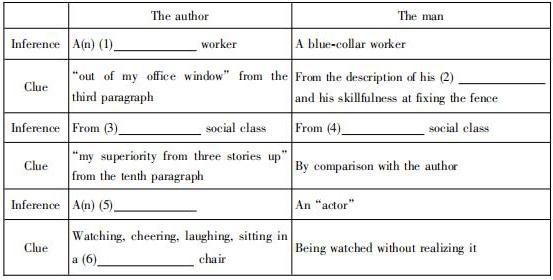向窗外看去
刘珂


你会经常看向窗外吗?通过看窗外,你的眼睛会看见什么?你的大脑会想象什么?有人看见窗外阴晴变幻的天空;有人看见枯荣交替的花草树木;也有人看见高楼大厦、车水马龙……本文的作者在一个寻常的工作日上午从办公室看向窗外,目睹了一场小小的事故,受到了巨大的震撼,從此改变了作者看待自身与他人的态度。
本文为短篇故事,全文627词,建议用时7分钟。
1. 梳理故事梗概,推测作者和故事主人公的身份信息;
2. 分析阐释作者和故事主人公身上体现出的品质特点;
3. 深入挖掘故事中包含的道德寓意,从不同角度分析理解窗户的象征意义。
A window is a common but powerful tool—a patch of the world, from which we are physically isolated. The only thing you can do is look. You have no influence on what you will see. However, your brain is forced to make a drama out of whatever happens to appear.
One day, I was taking a nap in the red chair in my office when I woke up to the sound of a car crash. I sat up and looked immediately out of my window. Across the street, in the parking lot, a car had just backed into a chain link fence. The car must have been moving fast, because it was in bad shape. Its hood had popped up, and part of its bumper (保险杠) was sitting on the ground. The fence was mangled (损坏).
I couldn t believe what I saw, on an otherwise ordinary weekday morning out of my office window. I watched the driver get out of the car. He was stocky (矮壮的) with a shaved head; he wore cargo shorts (工装短裤) and a flannel shirt unbuttoned to expose his chest hair. I disliked him immediately. After a few seconds of assessing the damage, he walked around the car and opened the passenger door, from which a very small child scrambled out. A toddler in the front seat! My disdain (鄙视) for the man increased exponentially.
As the child ran around in the parking lot, the man tried to repair the damage he caused. He attempted to tug the ruined fence back into place, but it wouldn t move.
I sat in my red chair, looking out of my window, silently cheering.
The man tried, a little harder, to fix the fence. He grabbed its support pole, and pulled against it with his full weight. The pole suddenly broke, and the man fell hard onto the blacktop (柏油路). The entire fence fell on top of him, and one of his sandals(凉鞋) went off and landed 10 feet away on the sidewalk.
I think I laughed out loudly. This was a slapstick masterpiece. It was brightening my whole day, the failure of this terrible man. He climbed out from under the collapsed fence and limped back to the apartment building above the lot, rubbing his elbow.
That, I thought, would be the end of it. The man—that villainous (可憎的) man—was going to leave all the chaos behind for someone else to clean up. It was only the middle of the morning, but I imagined that he sprawled out on his sofa with a case of beer, eating horrible snacks, while his child played with fire and broken glass near a malfunctioning electrical socket (插座).
Ⅱ. Understand the title.
What does “the window” in the title symbolize? Does it symbolize eyes or screens or both? What is the deep meaning of the title Looking out of the window?
【點石成金】本文从标题到内容都运用了一些象征的写作手法。象征手法是根据事物之间的某种联系,借助某人或某物的具体形象(象征体),以表现某种抽象的概念、思想和情感。它可以使文章立意高远、含蓄深刻。恰当地运用象征手法,可以将某些比较抽象的思想概念化为具体的可以感知的形象,赋予文章以深意,从而给读者留下回味的余地。
提升·素养建构
Ⅰ. 读后写作
假设你是本文作者,你想把本文故事发生当天自己的所见所感告知文中男主人公,请你写一封信给男主人公,内容包括:
1. 说明自己的身份;
2. 描述当天发生的事;
3. 表达钦佩与感激之情。
Ⅱ. 视野拓展
在英语语言中,窗户是一个十分常见的文化意象,除了“眼睛是心灵的窗户(The eyes are the windows of the soul.)”之外,窗户也常用来象征机会,有许多相关的名言,意味隽永,发人深省。
1. If God closes the door, somewhere he opens a window.
如果上帝向你关上了一扇门,他会为你开一扇窗。
2. The purpose of education is to turn mirrors into windows.
教育的目的就是把镜子变成窗户。
3. If a window of opportunity appears, don t pull down the shade.
当机会的窗口出现时,不要拉下帘子。
4. Never hesitate to open new windows in your life!
永远不要对打开人生的新窗户感到犹豫!
5. Each day, life will send you little windows of opportunity. Your destiny will ultimately be defined by how you respond to these windows of opportunity.
每天,生活都会给你送来小小的机会之窗。你的命运最终取决于你对之做出的反应。

